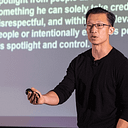The New Productive Compassion
Whenever people talk about the “soft skills” needed to be successful, there are those that roll their eyes and dismiss it, believing it is not as important as just being competent in your job. In other words, developing “soft skills” will lead to more success and effectiveness, while others scoff at it.
Obviously I fall on the spectrum of developing soft skills, and over the next several journals, we’ll discuss specifically COMPASSION. Over the past couple years, this is probably the singular concept that has changed the way I behave in every aspect of life. I’m happier for it and others are happier for it. This may be the key to everything — success, happiness, and immortality.
The Compassion Requirement
Inc. article by @MarcelSchwantes highlight’s a new book by Tom Peters, who states:
Hard is soft. Soft is hard. In other words, “Hard” (the plans, numbers, and systems) is “soft.” “Soft” (people, relationship, culture) is “hard.”
LinkedIn CEO Jeff Weiner, perhaps the most outspoken of any high-profile leader on the effects of “compassionate management,” tweeted in 2017:
Big misconception about managing compassionately is that it’s a “soft” skill. Most compassionate people I know are typically the strongest. — Jeff Weiner October 6, 2017
If you’re a non-believer, ask yourself how many top CEO’s, leaders of leaders, need to state that developing soft skills and compassion is what it takes to be successful?
If you’re already a believer in developing soft skills, have you focused on compassion enough?
Are you a compassionate leader? Take this free assessment by the Harvard Business Review to see where you’re at, and get practical tips. For me, I scored in Quadrant 2, which means I value compassion and wisdom, but there’s room to grow.
Feeling Burned Out? Here’s What To Do.
I get burnt out at work whenever I feel overwhelmed. Between my to-do list, my inbox, and the paper on my desk, it’s all too much. It actually all started back in college when I felt this way when all the assignments piled up. So what did I do? One thing at a time. Once I got an idea of all the work, I prioritized and then focused on one thing only. After that, I tackled the next one. I didn’t allow myself to dwell on the big picture, because that would just get me overwhelmed. One thing at a time.
This great Tricycle article by Pamela Gayle West defines burnout as:
In psychology, burnout is most often defined as a three-phase depletion that unfolds as emotional exhaustion, or not feeling up to caring for others; depersonalization of those one is committed to helping; and a reduced sense of personal accomplishment or agency.
At some point we will experience burnout again. So what do we do? Resilience seems to be the key, which I define as, “the ability to see options that could overcome the challenge.”
Developing your ability to be compassionate, leads to being more resilient, which leads to less burnout.
Productivity Tips on Compassion
Only a newbie would think taking time to be compassionate to others is a waste of time. The truth is, taking time with others to understand will pay dividends in the future. Not that we’re doing it for that reason, it’s just a nice side-effect.
Personally, I need to constantly remind myself that there will be time later to complete my tasks, but it’s rare to get a chance for real one-on-one conversations to learn about someone. It’s a gift.
Tips:
- Watch cat videos (just kidding)
- Give yourself a minute to fully arrive. For example:
- Sit in the car before heading into the office
- Arrive to the meeting early and take a minute to think who you are
- Put down the phone and just take in your surroundings
- In line? Just people-watch and monitor yourself
“An inspiring palliative care physician I know says that taking extra time to wash his hands deliberately and with mindful awareness between patient visits allows him to put one situation aside so he can enter the next one with freshness and goodwill.”
How to Use Compassion to Make a Greater Impact
Where does compassion fit into the context of being an entrepreneur, being an executive, or being a highly productive person? I believe the answer is to incorporate being compassionate into our day-to-day interactions with people and choosing to believe positive intent. Better yet, fold compassion into your business model, such as helping your community or the environment. For example, brands like Miir, Human Gear, and Moment have all signed on to be Certified Climate Neutral. Compassion is good for everybody.
The more people who are in need, the less likely many of us are to want to help — a phenomenon called “compassion collapse.”
Sound familiar? Ahem, climate change, immigration policy, hate and racism?
Stanford University social psychologist Jamil Zaki, author of The War for Kindness states, “the challenge is how to scale ancient emotions to a global context.”
To overcome, come up with a ‘concrete’ helping strategy that shows you leading to making an impact. Reframe that negative emotion into doing something. Ask yourself, “what step can I make, no matter how small.” That’s why it’s been a successful strategy to raise donations by telling donors exactly where that money goes and how it helps.
Think of a crisis you’re passionate about and brainstorm small steps you can take right now.
HELP ME OUT?
Donate just $1 to help me keep doing what I love, which is writing articles like this. Thanks!
References:
- https://hbr.org/2018/05/assessment-are-you-a-compassionate-leader
- https://tricycle.org/trikedaily/burnout/
- https://www.lionsroar.com/what-can-we-learn-from-an-android-buddhist-preacher/
- https://thriveglobal.com/stories/renew-compassion-suffering-positivity-giving-care-well-being/
- https://thriveglobal.com/stories/7-great-ways-self-compassion-can-make-your-life-easier/
- https://www.inc.com/marcel-schwantes/the-1-law-of-leadership-that-will-make-people-want-to-follow-you.html
- https://www.opendemocracy.net/en/transformation/time-new-thinking-about-mindfulness-and-social-change/
